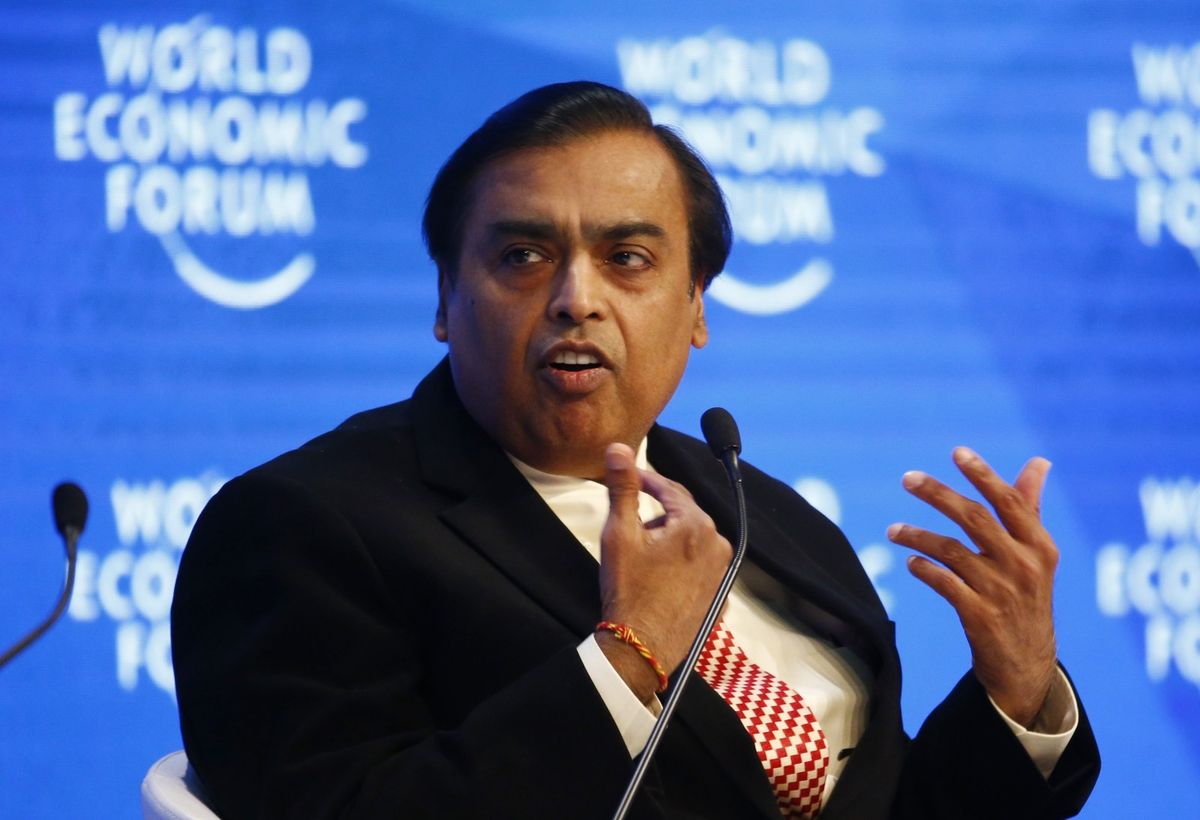After multibillion-dollar investments in Jio, can India’s richest man deliver?

A few minutes every morning is all you need.
Stay up to date on the world's Headlines and Human Stories. It's fun, it's factual, it's fluff-free.
The head of Reliance, Mukesh Ambani, has promised investors that his company will bring about a digital revolution in the country and further India’s development using its own 5G infrastructure.
2020 was a good year for India’s largest company, Reliance Industries Limited.
Reliance’s subsidiary, Jio Platforms Ltd., the country’s largest telecoms provider, secured billions of dollars worth of funding from global giants such as Facebook Inc. and the Emirati sovereign wealth fund Mubadala Investment Company PJSC.
Jio upended India’s telecoms industry several years ago to become the country’s biggest provider, despite competing against more established rivals. The head of Reliance, Mukesh Ambani, has promised investors that his company will bring about a digital revolution in the country and further India’s development using its own 5G infrastructure.
Investors in Reliance Industries are now waiting to see if Ambani, India’s richest man, can deliver on his promises.
Reliance has a number of obstacles to overcome first though.
Its growing online retail operations face a challenge from e-commerce giants such as Amazon.com, Inc. and India’s escalating tensions with China have raised questions concerning the company’s future growth.
Up to this point, though, Reliance Jio’s climb to dominate the Indian telecoms market has been just as improbable as it has been massively successful, proving there is perhaps more to Ambani’s ambition than mere bluster.
Reliance growth
In 2020, India’s Reliance was hugely successful in selling a vision of a digitized India to global investors.
Jio Platforms, the telecoms arm of Reliance Industries, secured billions of dollars of investment from Facebook, the Abu Dhabi Investment Authority and its sister state-owned investment fund, Mubadala. American chipmakers Qualcomm and Intel Corporation also invested millions in Jio’s operations.
So successful was Jio, that Ambani’s own personal fortune rose from some US$18.3 billion to US$76.9 billion in 2020.
Central to the company’s sales pitch was the way it had completely upended India’s telecoms market.
Having only been founded in 2016, Jio was a late arrival to a market dominated by the likes of Vodafone and others, but it soon rose to be the largest network provider in a country of more than 1.3 billion people.
Jio attracted investors as a result of its plans to expand network coverage across the subcontinent and the likelihood that it would form a central part in India’s future 5G infrastructure, from which Chinese telecoms giant Huawei Technologies has been unofficially banned.
Investment returns
Following this fundraising success, investors are awaiting signs that Ambani can deliver on Reliance’s and Jio’s expansion.
A move into the competitive e-commerce sector – as well as into a 5G sector that is demonstrably unstable – would be no easy feat for Reliance. The conglomerate’s business has traditionally focused on energy and petrochemicals, with more recent expansion into digital services, media and entertainment.
Ambani has made no secret of his ambition to transform Reliance and, with it, India itself. In a call to shareholders, Ambani stated that “the time has come for a truly global digital product and services company to emerge from India.”
In expanding its e-commerce offerings with JioMart and Reliance Digital, Ambani’s Reliance faces a difficult challenge from established rivals Amazon.com and Walmart Inc.’s Flipkart Online Services Pvt.
The combined physical and digital sales of Reliance Retail and JioMart amount to around US$12 billion, against some US$14 billion each in digital sales for Amazon and Flipkart, illustrating the challenge facing Reliance’s e-commerce and digital ambitions.
Analysts seem confident that Ambani will succeed in overcoming these challenges and paying back investors for their multibillion dollar backing.
Nandan Nilekani, co-founder of consulting firm Infosys Ltd., believes that Ambani has a “terrific eye for execution” and is not “known to give up.”
Ambani also appears to have the support of India’s government, which has taken steps to restrict the dominance of multinational giants while encouraging domestic growth.
Chinese competitors in the crucial 5G sector have been frozen out, whereas foreign e-commerce providers such as Amazon face numerous restrictions on their ability to own inventory and undercut domestic suppliers.
According to James Crabtree, an associate professor of practice at the Lee Kuan Yew School of Public Policy at the National University of Singapore, India’s Prime Minister Narendra Modi “has clearly decided that he wants to produce an Indian equivalent of Alibaba or Tencent, and he knows Reliance is the only plausible candidate.”
Should Reliance’s expansion into e-commerce and the digital and tech sector prove successful, this would almost certainly result in returns for investors. The e-commerce sector is projected by Morgan Stanley to generate US$200 billion in sales annually by 2026.
However, with numerous international competitors, as well as looming questions over Reliance’s succession plan, repaying investors for billions of dollars worth of financial support may prove a challenging task.
But as Ambani’s success in solidifying Jio Platforms as India’s largest telecom provider has already shown, no task is seemingly too difficult for India’s richest man.
Have a tip or story? Get in touch with our reporters at tips@themilsource.com




Comments ()